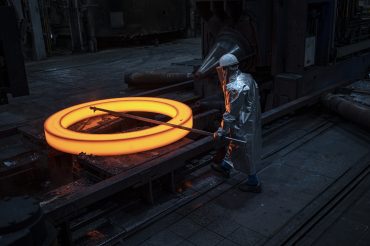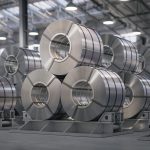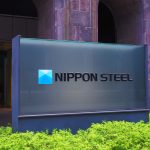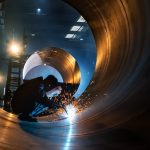

ThyssenKrupp’s steel mill modernization in Duisburg doubles production capacity while advancing automated manufacturing systems
Key Takeaways
- €800 million investment completed – ThyssenKrupp modernizes Duisburg hot rolled strip mill, increasing capacity from 1.8 million to 3.1 million metric tons annually
- Advanced automation systems deployed – New facility features digital twin technology and automated logistics, positioning ThyssenKrupp as a leader in smart steel manufacturing
- Strategic restructuring continues – Company cuts workforce by 40% to 11,000 employees while investing in premium steel production for electric mobility and energy applications
Introduction
ThyssenKrupp Steel has completed an €800 million modernization of its hot rolled strip mill at the Duisburg site, dramatically expanding production capacity and introducing cutting-edge automation systems. The German steelmaker increased the facility’s annual capacity from 1.8 million to 3.1 million metric tons, making it one of Europe’s most advanced steel production networks.
The modernization represents a critical strategic investment as European steelmakers face intense competition from Asian producers and mounting pressure to innovate. The upgraded facility produces premium steel grades specifically designed for electric mobility and energy applications, targeting high-growth sectors.
Key Developments
The modernization project involved a complete overhaul of the hot strip mill over a two-year construction period. The new facility can roll coils with widths ranging from 900 to 1,600mm and gauges between 1.2 and 9mm, replacing a 20-year-old casting rolling line.
ThyssenKrupp commissioned a continuous caster capable of producing slabs in 257mm gauge and 900-1,800mm widths, exceeding 35 meters in length. The facility features a walking beam furnace that processes 380 metric tons per hour for cold applications and 560 metric tons per hour for direct applications.
The modernization includes fully automated slab logistics and digital process handling systems. These advances optimize the interface between upstream and hot strip production, enhancing both efficiency and product quality.
Market Impact
ThyssenKrupp returned to a net profit of €167 million in the first quarter of 2024/2025 after several loss-making quarters, largely due to asset sales. However, the steel division faced a €90 million hit from high energy costs, weak demand, and decarbonization investments.
Group sales dropped 5% to €8.6 billion in the second quarter, reflecting continued pressure from global competition and economic uncertainty. The company’s steel division remains under financial stress despite technological improvements.
In 2024, Czech EP Corporate Group acquired a 20% stake in ThyssenKrupp Steel, reflecting ongoing transformations within the firm and broader industry consolidation trends.
Strategic Insights
The investment positions ThyssenKrupp to compete more effectively in premium steel markets, particularly for automotive and energy applications. The company’s focus on stronger, thinner steel grades aligns with growing demand from electric vehicle manufacturers and renewable energy sectors.
ThyssenKrupp announced workforce reductions of 40%, cutting positions from 27,000 to 11,000 employees, while decreasing annual production capacity by 23% to target 8.7-9 million metric tons annually. This dual strategy of modernization and rightsizing reflects broader structural changes in the European steel industry.
The automation and digitalization investments create competitive advantages through improved quality control and operational efficiency. Digital twin technology enables real-time production monitoring, while advanced control systems ensure precise strip rolling processes.
Expert Opinions and Data
Dennis Grimm, CEO of ThyssenKrupp Steel, describes the project as “a decisive milestone in strengthening our leadership in technological and quality terms.” He emphasizes the investment’s role in improving competitive position despite challenging economic conditions.
Hans-Juergen Zeiher, Executive Vice President at Primetals Technologies, highlights the collaborative effort required for the project’s success. “Our teams have definitely gone the extra mile—both on the construction site and throughout the planning and engineering phases—to ensure the success of this challenging project,” he states.
Tekin Nasikkol, Chairman of the General Works Council, positions the project as a rejuvenating step for the Duisburg site. He emphasizes the modernization’s role in enabling effective competition and securing quality jobs in the challenging economic landscape.
The project’s significance extends beyond ThyssenKrupp, with political leaders including Mona Neubaur, Minister of Economic Affairs and Climate Protection, attending the facility’s startup celebration. This political engagement underscores the project’s importance to Germany’s industrial competitiveness.
Conclusion
ThyssenKrupp’s modernization represents a strategic bet on premium steel production and advanced manufacturing technologies. The company balances significant capital investment with aggressive cost-cutting measures as it navigates challenging market conditions.
The modernized facility enhances ThyssenKrupp’s capacity to serve growing demand in electric mobility and energy sectors while establishing new benchmarks for automation in European steel manufacturing. The investment’s success depends on the company’s ability to execute its restructuring plans and capitalize on emerging market opportunities in premium steel applications.








